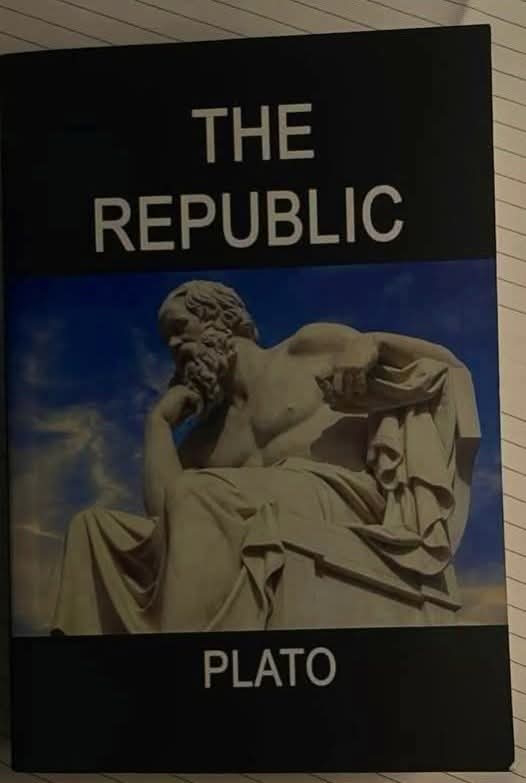At first glance, it is a dialogue about justice. But justice here is not limited to law or punishment; Plato is after something deeper. What is justice in a person? In a society? How do we structure a life, or a state, that honors the good, the noble, the true? Socrates, Plato’s enduring voice and hero, pulls us along with questions, always questions: unrelenting, precise, frustrating in their clarity. And through this relentless questioning, the reader begins to sense a shift within: a quiet invitation to doubt what we thought we knew.
What makes this book so enduring is not that it gives answers, but that it forces the reader to confront their own assumptions. As Socrates debates with Glaucon, Adeimantus, and others, the city-state they build: the kallipolis becomes a mirror. Every structure, every class, every policy is built with a purpose: to reflect a well-ordered soul. The city is not just a metaphor. It is a map of the inner world. Plato is, quite literally, designing a republic inside you.
In this imagined city, people are divided into producers, auxiliaries, and guardians. The rulers, philosopher-kings, are chosen not for wealth or popularity, but for wisdom, discipline, and their capacity to love the truth. It is here that Plato makes one of his most provocative claims, that only philosophers, those who see beyond appearances, who love the Form of the Good, should rule. To the modern ear, this may sound elitist. But what Plato offers is not tyranny by scholars, but governance by those least likely to be corrupted by power.
Perhaps the most haunting section is the Allegory of the Cave, a philosophical parable that feels more like poetry. It speaks to anyone who has ever struggled to free themselves from ignorance or confronted uncomfortable truths. We are the prisoners, Plato says, chained to the wall, mistaking shadows for reality. The philosopher is the one who breaks free, sees the sun, and returns to rescue others. But the tragedy? The prisoners may kill him for it. This single allegory is enough to make The Republic worth reading.
But Plato does not just speak to the mind, he stirs the conscience. He warns of what happens when society prizes appearance over substance, pleasure over discipline, or individual desire over communal good. Democracies, he says, can decay into chaos if freedom is misunderstood as the right to indulge every whim. Tyrannies are born not from strength, but from the collapse of self-control. These warnings feel eerily modern. Our politics, media, and even personal lives often mirror the decline Plato describes.
And yet, despite its austere architecture, The Republic holds surprising tenderness. It touches on music, on education, on the role of women, even on the immortality of the soul. Plato insists that the soul’s health matters more than wealth or pleasure. He likens the unjust person to a city at war with itself: noisy, divided, exhausted. The just person, however, is like a well-tuned instrument: harmonious, steady, at peace. Is that not what we all seek? Not just to do right, but to be right, inwardly ordered, grounded in meaning?
As the dialogue winds down, Plato offers the Myth of Er, a strange tale of souls choosing their next lives after death. It feels mythological, yes, but also deeply psychological. The choices we make today, Plato suggests, echo beyond death. We shape our souls with every act of justice or injustice. Even now, in a world obsessed with speed and surface, that message lands with quiet power: you are crafting who you are becoming.
For all its seriousness, The Republic is not a cold book. It is rigorous, yes, but it burns with longing: for wisdom, for order, for a life that is not wasted. There is beauty in its ambition. Plato is not content to describe the world. He dares to reimagine it. And in doing so, he asks us to do the same.
There is no denying that the text can be dense. It requires patience, especially for readers new to philosophy. But the rewards are immense. You emerge from it changed, like someone who has traveled through a difficult country only to find themselves stronger, clearer, and strangely more whole.
It is not a book to be read once. It is a companion for life, one you return to at different seasons, hearing new wisdom each time. It challenges, yes. It even offends. But it also heals, confronts, and uplifts. It demands that you think not just about what kind of world you want to live in, but what kind of soul you want to inhabit.
To read The Republic is to face yourself. It is to sit in judgment not of others, but of your own integrity. And in that judgment, to find a quiet call toward betterment, toward justice not as law, but as harmony between what you know, what you believe, and how you live.
In our fractured world, full of distractions and dissonance, this book reminds us that clarity is possible. That justice is not dead. That philosophy, when rightly practiced, is not distant or dry, but deeply human.
Plato’s The Republic may have been written over two thousand years ago, but its questions are still ours. It is not just a work of philosophy. It is a work of the heart. Read it not to agree, but to awaken. And once awakened, let it disturb you, humble you, and draw you closer to the life that is truly worth living.

No comments:
Post a Comment